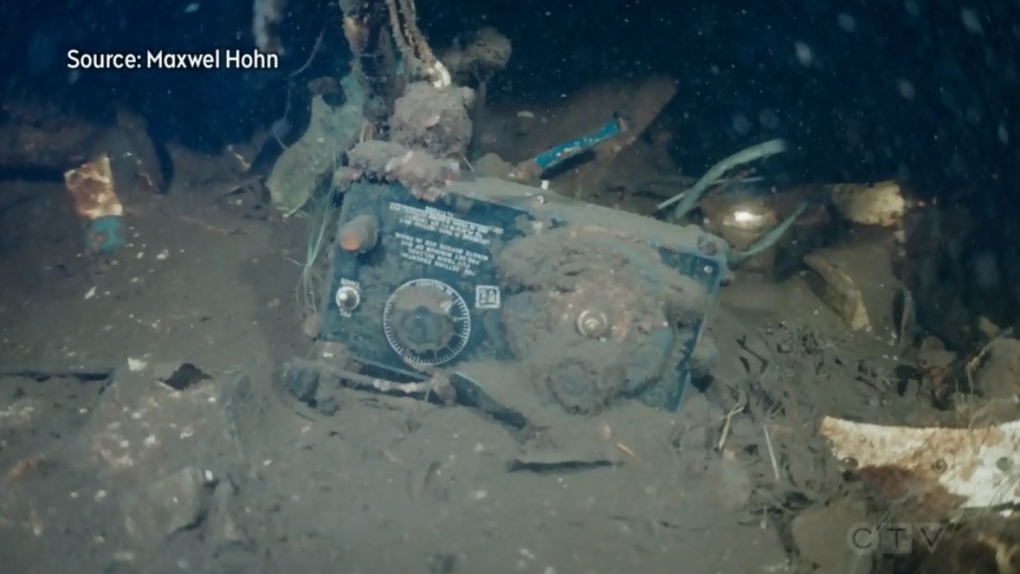'A bit haunting': Vancouver Island divers help locate crashed WWII bomber in Newfoundland
Five divers from Vancouver Island have been exploring parts of the East Coast that very few Canadians will ever see.
Divers Maxwel Hohn and Russell Clark from the Comox Valley, along with three others from the island, are part of an international team that reached the underwater crash site of a Second World War bomber in Gander Lake, Newfoundland.
The B-24 Liberator bomber crashed in 1943, killing all four crewmembers on board.
"When you come across this wreckage, it’s a mix of feelings. There’s sadness with excitement because the crew did lose their lives," said Hohn.
The initial dive on Monday was to scout out the wreckage and confirm it was there.
"It’s about 36 metres to 48 metres [down]. It’s kind of on a very, very steep slope," said Hohn.
"It’s been there since 1943 so I think it’s pretty secure where it is," he said.
DECADE-LONG SEARCH
A Newfoundland researcher had been looking for the aircraft for roughly a decade. Its position was finally narrowed down in June using side-scan sonar.
"The crash happened within a small distance of the Gander Air Force Base," said Comox Valley diver Russell Clark.
"At the time in 1943, navy divers were dispatched onto the aircraft to try to recover the bodies of the airmen," he said.
Only one body was recovered at the time. The remains of the other three airmen are still in the wreckage.
"Nothing was disturbed or touched or taken during the exploration, it was purely an image gathering dive," said Russell.
 An image of the wreckage is shown. (Maxwel Hohn)
An image of the wreckage is shown. (Maxwel Hohn)
Hohn added that the experience was eerie but rewarding.
"Getting down there you’re on a gravesite and it’s a bit haunting, but it’s also really exciting to find a piece of history and prove that this bomber is in this location," he said.
All details, maps and documentation on the bomber will be handed over to the Royal Canadian Air Force, which still owns the aircraft.
'IMPORTANT TO SHARE'
Monday's dives were conducted one day after the 79th anniversary of the crash.
The research team hopes the find will help bring Canadians closer to their history.
"It’s important to share this cultural history story with other Canadians that probably don’t know how much Newfoundland was embroiled in the Second World War," said Jill Heinerth, explorer in residence with the Royal Canadian Geographical Society.
"I knew nothing about the fact that German U-Boats came in and were sinking the wrecks at Bell Island and destroying the loading wharf from the Bell Island mine," Heinerth added.
"And these Liberator bombers would have been protecting some of these convoys," she said.
The team was near Bell Island again Wednesday searching for more artifacts.
CTVNews.ca Top Stories

Father and daughter found dead in northwest Calgary
Calgary police are investigating the death of a father and daughter on Sunday night as a double homicide and believe it's the result of a domestic incident.
Year in review: Notable people who died in 2024
Here is a roll call of some noteworthy figures who died in 2024.
opinion Tom Mulcair: Grading Trudeau's performance in 2024, and what's ahead for him in the new year
Prime Minister Justin Trudeau is about to enter the final year of his mandate and, quite possibly, of his political career, writes Tom Mulcair in his column for CTVNews.ca. The former NDP leader takes a snapshot of Trudeau's leadership balance sheet as a way of understanding how he got to where he is in the polls.
Murder, she spoke: Violence and death getting mentioned more often in movie scripts, study finds
A new study shows that movies have more violence in them than ever -- or at least, movie characters are more interested in talking about it.
Appeals court upholds US$5 million award in sexual abuse verdict against Donald Trump
A federal appeals court on Monday upheld a jury’s finding in a civil case that Donald Trump sexually abused a columnist in an upscale department store dressing room in the mid-1990s.
Gal Gadot reveals she underwent emergency surgery for brain clot just after welcoming her 4th child
Gal Gadot is opening up about how she survived a "massive blood clot" in her brain during her most recent pregnancy.
Passengers describe travel nightmare after WestJet flight from Costa Rica cancelled
It was a travel nightmare that left more than 100 passengers, including Ottawa residents, stranded in Costa Rica this week.
Chinese-Russian air co-operation has Norad's 'full attention'
The head of the North American Aerospace Defence Command says Chinese and Russian air co-operation in the Arctic has Norad's 'full attention.'
Linda Lavin, Tony-winning Broadway actor who starred in the sitcom 'Alice,' dies at 87
Linda Lavin, a Tony Award-winning stage actor who became a working class icon as a paper-hat wearing waitress on the TV sitcom 'Alice,' has died. She was 87.

































